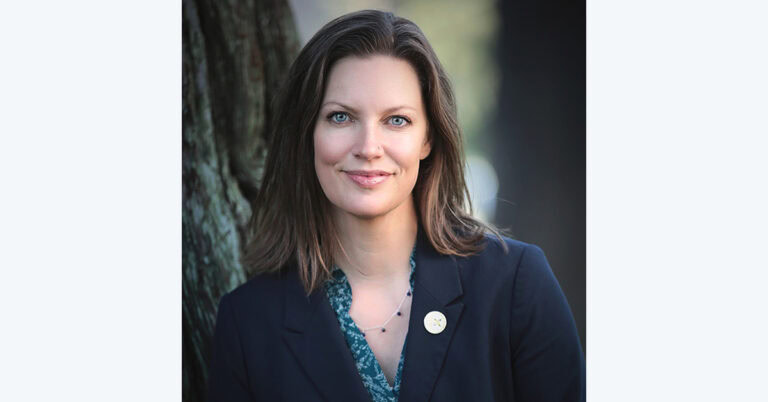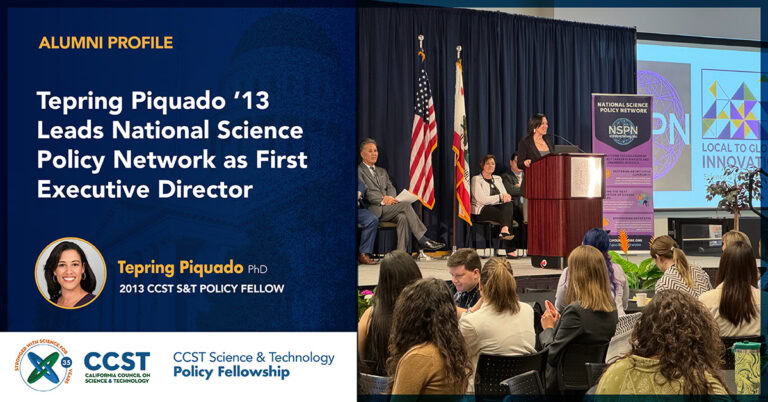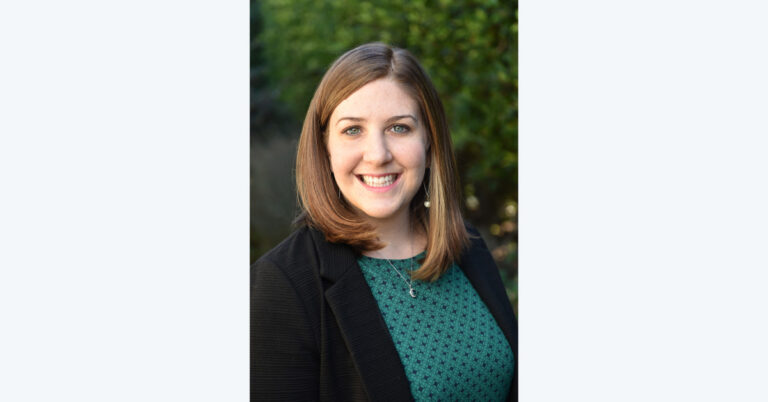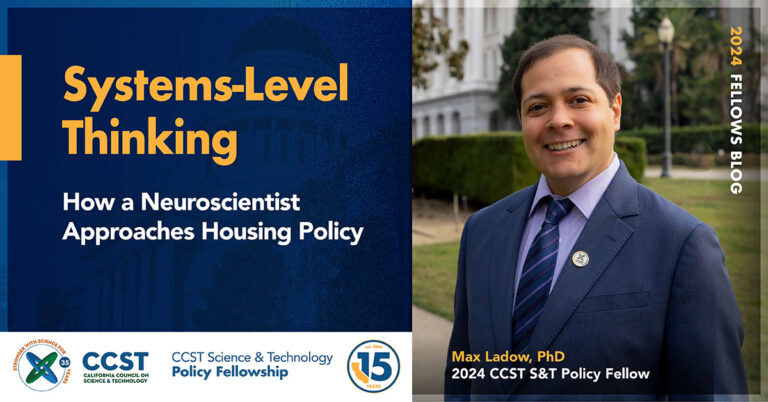CCST’s Brie Lindsey, PhD, Hired as Deputy Director at California Ocean Science Trust
Update: Application closed – Calling California Grad Students and Postdocs: Apply for CCST’s Science Translators Showcase
October 23, 2023 | CCST Newsroom, CCST Science & Technology Week, Events

Update (11/13/2023): The application for the 2024 CCST Science Translators Showcase is now closed. Please join us for the event and sign up to hear about future opportunities and events from CCST.
SACRAMENTO, Calif.—The California Council on Science and Technology (CCST) is excited to seek graduate students, postdocs, and early-career faculty in California for the CCST Science Translators Showcase, held as part of our 2024 Science & Technology Week at the California State Capitol!
The chosen Translators will get a chance to explain their research to legislative staffers, agency managers, and senior policy leaders during a networking event at the California State Capitol. We’re looking for candidates who are eager to learn and practice science communication skills and convey the relevance of their research to public policy questions. The goal of this experience is to improve their skills in offering impartial, nonpartisan advice to decision makers, to meet other amazing researchers, and to proudly represent their home institution.
[The application is now closed]
Applicants must satisfy the following eligibility criteria:
- Must be a graduate student (master’s or doctoral) or postdoctoral scholar in a science or engineering field at one of CCST’s Partner Institutions: University of California, California State University, Stanford, Caltech, University of Southern California, California Community Colleges or a NASA research center or a U.S. Department of Energy laboratory in California. Early-career faculty(within three years of first academic hire) from California Community Colleges are also invited to apply.
- Must be available to travel to Sacramento for the day-long event on Wednesday, February 7, 2024. Translators are eligible to request a travel award to subsidize their travel to Sacramento.
- Must be available to participate in four separate hour-long training webinars ahead of the event. These are scheduled for Friday, January 12, 19, 26, and February 2 at 2:00p (PST).
When completing the application, you will be asked to:
- Describe your research topic, and how it helps inform policy either in California or at the national or global scale (2000 character maximum, including spaces).
- Describe how the experience may benefit your career if you are chosen to participate in CCST’s Science Translator’s Showcase (2000 character maximum, including spaces). Reflect on your current level of experience as a STEM researcher and your understanding of science policy. How will this experience as a science translator support your future career interests?
- Share a list of URLs to your public social media accounts and/or blogs, if you own and manage such accounts. A public social media presence or blogging or science writing experience is not required to apply and will not diminish your application.
- Prepare a 60-second audition video to explain your research and how it helps inform potential policy solutions here in California or at the national or global scale. You will be asked to store the video online (e.g., YouTube, Vimeo, Google Drive, etc.) and provide a link to the video that is accessible to application reviewers.
- Upload a resume highlighting any experience to date in communication, outreach, education, and/or policy engagement. For further guidance on how to build your resume instead of your CV, including samples, please refer to UC Davis’ website about building a resume.
- List the name, email, and best phone number of a mentor, supervisor, or collaborator who can serve as a reference.
A critical component of the application process is the 60-second audition video. In it, applicants must explain their research and how it helps inform potential policy solutions in California or at the national or global scale. This is the applicant’s chance to demonstrate their ability to translate technical information engagingly and concisely and tailor their message and delivery to a senior policy making audience and staff.
For the 2024 Science Translator Showcase, CCST encourages applicants to focus their application material on disaster resilience. Disaster can be broadly defined by the applicant. Examples of disasters may include wildfires, extreme weather events, droughts and flooding, climate change, emerging public health concerns, and others that might reasonably be considered a disaster that can be prevented, prepared for, or mitigated through science, technology, and policy. Other examples may include technology and tools designed or used for preventing, preparing for, or recovering from such events. Disaster resilience is not a required component of the application and should not discourage applicants from applying.
Offers will be made in early December. Candidates will be chosen based on their audition videos, resumes, written statements, and other submitted material. In addition, candidates will be chosen to represent a diversity of research topics, home institutions, and personal experiences.
“The CCST Science Translators Showcase is an excellent opportunity for scientists and engineers interested in policy to engage with policymakers, especially for graduate students who are not yet able to apply for our CCST Science & Technology Policy Fellowship,” says Sarah Brady PhD, CCST Interim CEO. “CCST is excited to present some of the state’s most engaging early career researchers to the Capitol audience for what will be our fifth installment of the Science Translators Showcase series.”
CCST debuted its “Science Translators Showcase” event series in February 2018 at the California State Capitol during CCST’s Science & Technology Week. As many as 15 graduate students and postdocs from California campuses networked with legislators and staffers for an afternoon session. CCST is excited to once again host the Science Translator Showcase as part of its Science and Technology Week in February 2024.
—
Frequently Asked Questions:
Where do I apply?
The application is now closed.
What is the CCST Science Translators Showcase Program?
The CCST Science Translators Showcase Program aims to recruit graduate student researchers and postdoctoral researchers at leading California research institutions who are eager to practice their science communication skills in conveying the relevance of their research to public policy applications. Hosted in conjunction with CCST events in the California State Capitol and elsewhere, the program experience is designed to help rising STEM stars polish their craft and instinct for effectively delivering impartial, nonpartisan advice to decision makers — by bringing them face to face with legislative staffers, agency managers, and senior policy leaders.
What is the format of a CCST Science Translators Showcase?
The event format intentionally breaks from academic tradition: instead of presenting large posters or lengthy slideshows packed with dense jargon, participants will simply be armed with their flair for conversation and their budding talent for communicating science in an open-networking setting. Showcase participants will be stationed throughout an event space, and event guests will be able to roam about freely to mingle, meet, and chat with each participant. Showcase participants must be ready to adapt and adjust their message and conversational approach depending on the title and expertise of the guest they are speaking to — hence the program’s emphasis on a 60-second audition video demonstrating a candidate’s ability and energy for concise messaging and engaging dialog.
Why are early-career faculty from California Community Colleges eligible to apply, but not those from other California institutions?
CCST’s Science Translators Showcase Program aims to elevate graduate and postgraduate researchers who are making valuable contributions to California’s strength in research and discovery. The California Community Colleges System is one of CCST’s important institutional partners; they form a critical part of California’s STEM innovation landscape and recruit some of our State’s most promising doctoral graduates and postdoctoral researchers into their instructional rosters. Whereas many of our partner institutions employ large numbers of graduate students and postdocs in their research programs, the California Community Colleges typically do not. By highlighting the contributions of new community college instructors, CCST can include recent grad students and postdocs who may have a perspective different than those in other research settings.
What kind of training and preparation is offered by CCST for showcase participants?
All invited participants must attend a series of webinar workshops hosted by CCST. The webinars offer geographically distant participants a chance to get to know one another ahead of the event and help one another improve their messaging. The webinar curriculum will cover essential skills such as science communications basics and understanding decision makers as an audience. Additional webinars and office hours will guide participants in refining their delivery, conversational approaches, and messaging slogans.
Who will be the guest audience for the 2024 CCST Science Translators Showcase?
The February 2024 showcase will take place during CCST’s Science & Technology Week near the State Capitol in Sacramento — which will see leaders in the policymaking area, including legislative staffers, state agency managers, and even State Senators or Assemblymembers, depending on their availability. There will also be current and former CCST Science Fellows, many of whom now work in the Legislature or state government, as well as experts from CCST’s Partner Institutions.
What kind of research and expertise is CCST looking to showcase?
We welcome applicants from a wide array of research areas, with a particular focus on research that affects or could be applied to Californians — be it urban or land use planning, public health, ecological health, natural hazards, computing, engineering, energy, agriculture, waste management or any number of other topics. All applicants must be able to concisely describe their research topic, and how it helps inform potential policy solutions for California.
###
About the California Council on Science and Technology
The California Council on Science and Technology is a nonpartisan, nonprofit organization established via the California State Legislature in 1988. CCST responds to the Governor, the Legislature, and other State entities who request independent assessment of public policy issues affecting the State of California relating to science and technology. CCST engages leading experts in science and technology to advise state policymakers—ensuring that California policy is strengthened and informed by scientific knowledge, research, and innovation.






